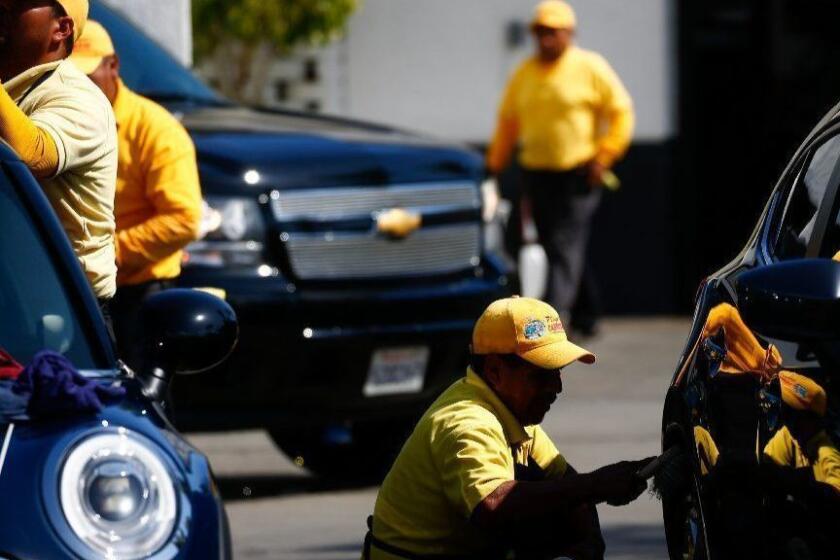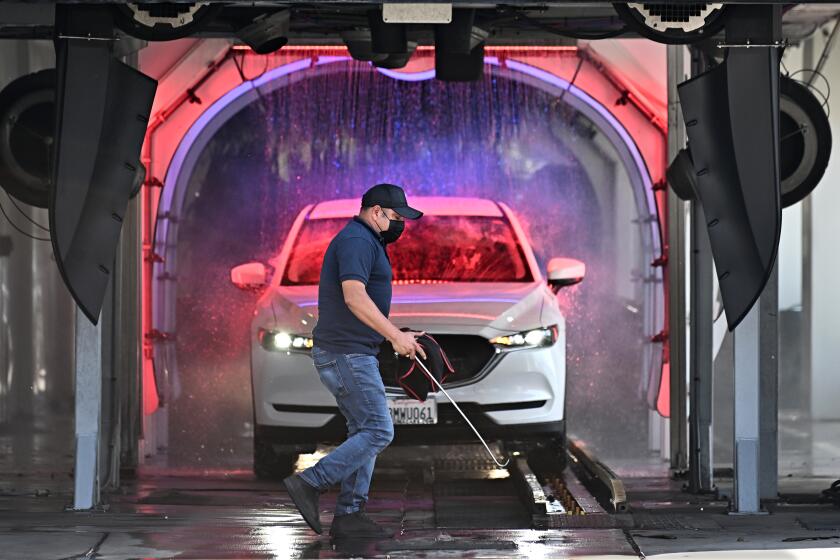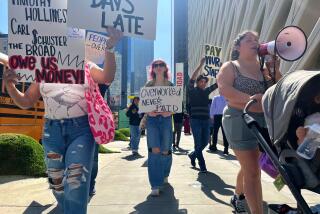This Inglewood carwash paid workers $7 an hour, state officials say. The penalty: Over $900,000
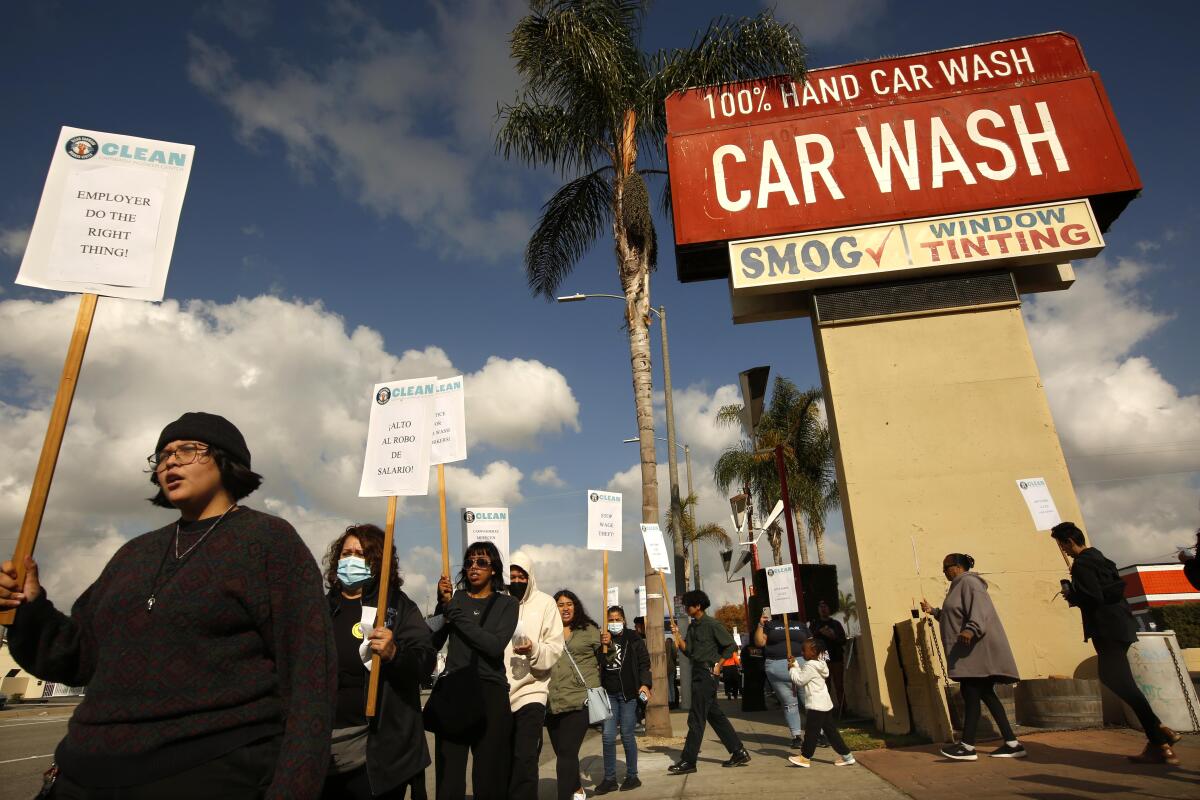
On a grimy Inglewood sidewalk, scores of protesters marched in circles, hoisting signs reading “Justice for Carwash Workers” and shouting “Down with greedy bosses,” “Wash your car elsewhere” and “Stolen wages.”
The Tuesday demonstration, mounted by labor and community groups, was aimed at the squat stucco facility of Shine N Bright, where a half-dozen workers were polishing and vacuuming cars.
In the latest crackdown against wage theft in Southern California, state officials had announced that morning that they would penalize the Hawthorne Boulevard carwash operator more than $900,000 for paying workers far below the minimum wage and denying them overtime and rest breaks.
Over a four-year period, 15 workers were allegedly paid a daily flat rate as low as $70 for eight to 10 hours of work, at a time when the state minimum wage went from $10.50 an hour to $14 an hour for businesses with 25 or fewer employees.
“Wage theft is not fair,” said Fausto Hernandez, a former Shine N Brite worker who addressed the crowd. Hernandez, 62, said workers had often complained to the carwash’s owner, Michael Zarabi, “but he ignored us.”
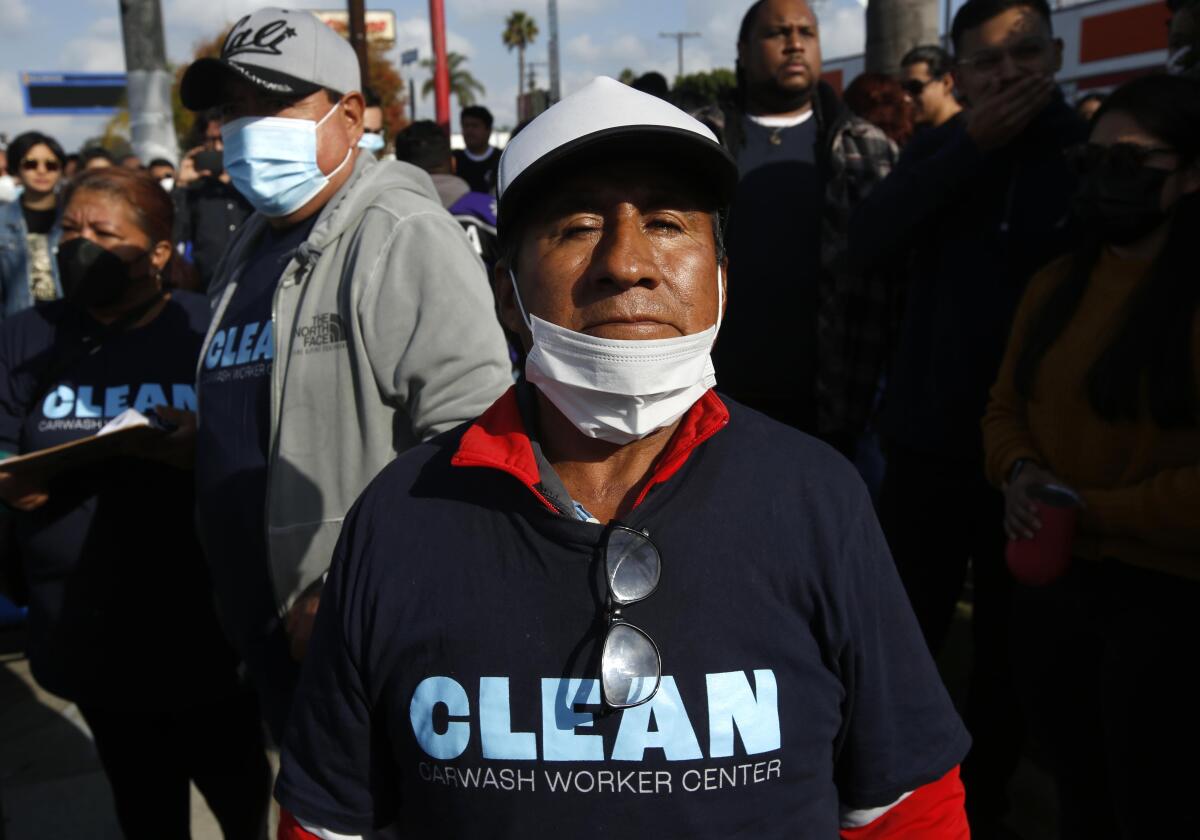
The $70 flat daily rate made it hard for Hernandez to help with the $1,800 monthly rent for the two-bedroom apartment in Inglewood he shares with two sons, a daughter-in-law and three grandchildren, he said. Nor could he always afford the $250 a month he sends his wife, who is in Mexico caring for her elderly mother.
Zarabi did not respond to a request for comment. As the protesters gathered at the facility, Joe Zarabi, who said he was the owner’s cousin and manager of the business, declined to discuss what workers were paid.
Wage theft is common nationwide but rampant in the carwash industry, according to worker advocates and labor enforcers. State and federal citations of $1 million or more are not unusual, but many remain uncollected in the face of drawn-out appeals and businesses that change hands to avoid paying.
In Los Angeles County, more than 500 carwashes normally employ as many as 10,000 workers, largely immigrants from Mexico and Central America, although the number has dropped during the pandemic. Business groups say most carwashes follow the law, but they face cost-cutting pressures as customers seek ever-cheaper service.
Among low-wage employers — such as garment factories, restaurants, construction sites and residential care homes — carwashes stand out as “cutthroat businesses,” said Matthew DeCarolis, a Bet Tzedek legal services attorney who represents the Shine N Brite workers. “In Los Angeles, a car-centric county with carwashes on almost every corner, we see a lot of violations.”
In the largest wage-theft case ever brought by the state of California against a private company, the labor commissioner has cited a City of Industry framing and drywall subcontractor for cheating more than 1,000 workers out of minimum wage, overtime and rest breaks on 35 construction sites across the Los Angeles region.
The 15 Shine N Brite workers are immigrants from Latin America who speak little to no English, according to the Clean Carwash Worker Center, a small, foundation-funded nonprofit that brought the Inglewood case to the state’s attention and led the protest.
An estimated 90% of carwash workers are undocumented, a status that makes them particularly vulnerable to retaliation if they complain, said Flor Rodriguez, Clean’s executive director.
“The majority of carwashes are not paying workers for the full time they’re working,” she said. “Often there’s no respect for overtime and some are forced to work for tips only.”
Clean Carwash investigators say many workers are required to report to the job early in the morning but are not paid until they wash their first car, sometimes hours later. And they toil long hours in the heat, are exposed to harsh chemicals and are often denied lunch or rest breaks.
“These workers were paid as low as $7 an hour, which is unconscionable,” Labor Commissioner Lilia Garcia-Brower said in a statement. “This employer used different schemes to avoid paying legal wages, such as paying flat daily rates, and paying workers in cash.”
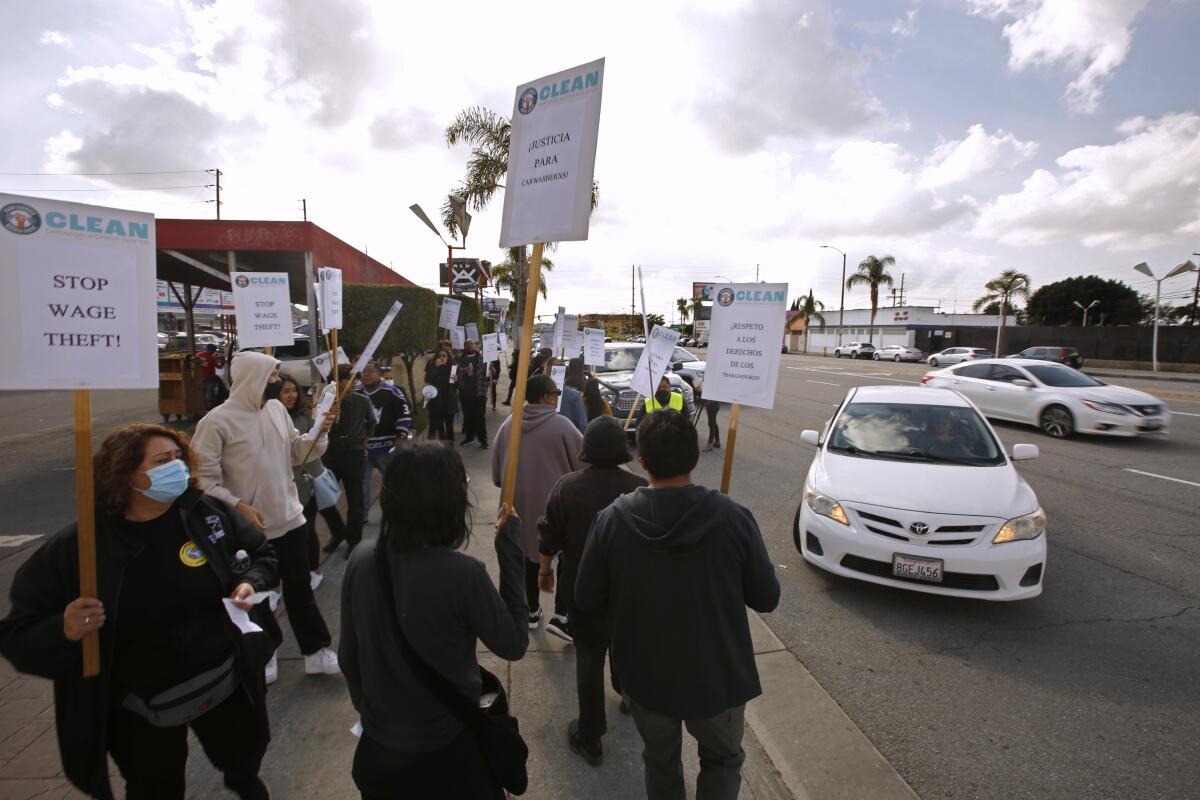
Shine N Brite’s penalties of $908,998 would grant the workers $818,548 in back wages and damages. Individual workers are owed between $15,766 and $92,246, under the citations.
The business also faces $5,835 in fines from California’s Division of Occupational Safety and Health after a March investigation found 14 instances of unsafe electrical equipment, hazardous machinery, a lack of protective gear and other violations. Michael Zarabi has appealed one of the citations relating to machinery operation.
Even when the state assesses large penalties, they often go uncollected, with carwashes changing ownership or seeking delays through bureaucratic and court appeals.
Across various industries, some 30,000 California workers file wage claims every year, overwhelming an understaffed Labor Commissioner’s Office, according to a 2020 report by the nonpartisan Legislative Analyst’s Office.
In 2017, less than half of workers who were awarded back pay were able to collect any unpaid wages from their employer. On average, workers waited 396 days for the state to adjudicate their wage claim, the report said.
In the largest wage-theft case ever brought by the state of California against a carwash company, Beverly Hills auto dealership mogul Hooman Nissani has been ordered to pay $2.4 million in back wages and penalties.
In 2019, in the largest carwash wage theft case ever brought by the state of California, Beverly Hills auto dealership mogul Hooman Nissani, who had boasted on his personal website that his businesses generated more than $1 billion in sales in 2016, was fined $2.36 million in back wages and penalties.
The state alleged that his Playa Vista Car Wash in Culver City cheated 64 workers out of minimum wages and overtime over three years. Managers regularly altered workers’ time cards, the agency alleged.
Nissani appealed the citations, saying the investigation was flawed. Three years later, a settlement remains under negotiation.
California carwashes have also come under federal scrutiny for failing to pay even the current U.S. minimum wage of $7.25 an hour — less than half of the state’s pay floor.
In a 2018 consent decree, a federal judge ordered one Southern California carwash mogul, Vahid David Delrahim, to pay $4.2 million in back wages and penalties after a two-year court battle.
Nearly $750,000 will be paid to workers while the state will collect nearly $70,000 in fines, officials said.
Over five years, Delrahim, owner of some 100 carwashes and gas stations, cheated 800 workers at a dozen carwashes in Orange, Los Angeles, San Bernardino and Ventura counties, federal officials alleged. A Delrahim spokesperson said the settlement was “a business decision,” and Delrahim did not admit to “any wrongdoing on our part.”
Among 62 carwash cases brought by the state this year, a large one targeted Torrance Car Wash, which was fined $815,311 in April for wage theft involving 35 workers.
The business, owned by Susan Amini and Reza Albolahrar, failed to pay workers for all the hours worked and for wait times, and did not provide meal and rest breaks, the agency alleged.
DeCarolis, the Bet Tzedek attorney, said that despite the state agency’s record of long delays and low staffing, he was hopeful that the Shine N Brite workers would eventually receive back pay.
“These workers are courageous and persistent,” he said. “When they are paid properly, they can afford to pay rent and put food on the table.”
Moreover, he added, “Targeting the worst actors with the worst violations will help level the playing field for employers that follow the law but are being undercut by unfair business practices.”
More to Read
Inside the business of entertainment
The Wide Shot brings you news, analysis and insights on everything from streaming wars to production — and what it all means for the future.
You may occasionally receive promotional content from the Los Angeles Times.

